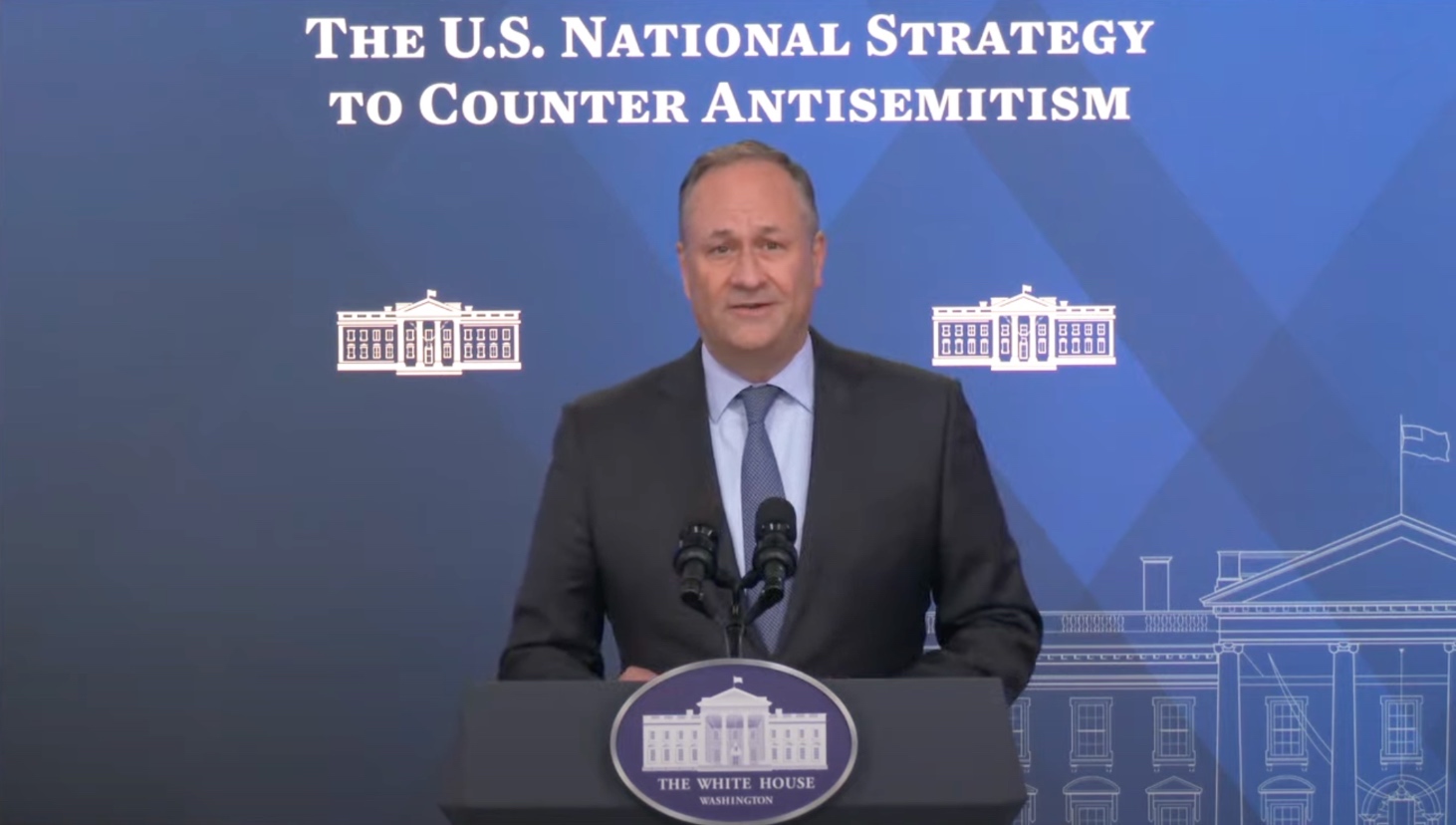WASHINGTON (JTA) — President Joe Biden unveiled a multifaceted and broad strategy to combat antisemitism in the United States that reaches from basketball courts to farming communities, from college campuses to police departments.
“We must say clearly and forcefully that antisemitism and all forms of hate and violence have no place in America,” Biden said in a prerecorded video. “Silence is complicity.”
The 60-page document and its list of more than 100 recommendations stretches across the government, requiring reforms in virtually every sector of the executive branch within a year. It was formulated after consultations with over a thousand experts, and covers a range of tactics, from increased security funding to a range of educational efforts.
The plan has been in the works since December, and the White House has consulted with large Jewish organizations throughout the process. The finished document embraces proposals that large Jewish organizations have long advocated, as well as initiatives that pleasantly surprised Jewish organizational leaders, most of whom praised it upon its release.
Among the proposals that Jewish leaders have called for were recommendations to streamline reporting of hate crimes across local, state and federal law enforcement agencies, which will enable the government to accurately assess the breadth of hate crimes. The proposal also recommends that Congress double the funds available to nonprofits for security measures, from $180 million to $360 million.
One proposal that, if enacted, could be particularly far-reaching — and controversial — is a call for Congress to pass “fundamental reforms” to a provision that shields social media platforms from liability for the content users post on their sites. The plan says social media companies should have a “zero tolerance policy for hate speech on their platforms.”
In addition, the plan calls for action in partnership with a range of government agencies and private entities. It says the government will work with professional sports leagues to educate fans about antisemitism and hold athletes accountable for it, following instances of antisemitic speech by figures such as NBA star Kyrie Irving or NFL player DeSean Jackson.
The government will also partner with rural museums and libraries to educate their visitors about Jewish heritage and antisemitism. And the plan includes actions to be taken by a number of cabinet departments, from the Department of Veterans Affairs to the USDA.
“It’s really producing a whole-of-government approach that stretches from what you might consider the obvious things like more [security] grants and more resources for the Justice Department and the FBI,” said Nathan Diament, the Washington director of the Orthodox Union. “But it stretches all the way across things that the Department of Labor and the Small Business Administration can do with regard to educating about antisemitism, that the National Endowment of the Humanities and the President’s Council on Sports and Fitness can do with regard to the institutions that they deal with.”
An array of Jewish organizations from the left to the center-right echoed those sentiments in welcoming the plan with enthusiasm, marking a change from recent weeks in which they had been split over how the plan should define antisemitism. Still, a handful of right-wing groups blasted the strategy, saying that its chosen definition of antisemitism diluted the term.
Despite the relatively united front, there are elements of the strategy that may stoke broader controversy: Among a broad array of partner groups named in the plan is the Council on American-Islamic Relations, whose harsh criticism of Israel has led to relations with centrist Jewish organizations that are fraught at best. The call to place limits on social media platforms may also upset free speech advocates.
Biden recalled, as he often does, that he decided to run for president after President Donald Trump equivocated while condemning the neo-Nazis who organized a deadly march in Charlottesville, Virginia, in 2017.
“Repeated episodes of hate — including numerous attacks on Jewish Americans — have since followed Charlottesville, shaking our moral conscience as Americans and challenging the values for which we stand as a Nation,” Biden wrote in an introduction to the report.
The administration launched the initiative last December, after years during which Jewish groups and the FBI reported sharp spikes in antisemitic incidents. The strategy was originally planned for release at its Jewish American Heritage Month celebration last week, but was delayed, in part because of last minute internal squabbling over whether it would accept a definition of antisemitism that some on the left said chilled free speech on Israel. Some right-wing groups were deeply critical of the new strategy for not accepting that definition to the exclusion of others.
Rabbi Levi Shemtov, the executive vice president of American Friends of Lubavitch (Chabad) praised the breadth of the plan, and said the delay seemed to produce results.
“The White House has taken this very seriously. The phrase that something is still being worked on can often be a euphemism for a lack of concern,” he said. “In this case, it seems to have resulted in an even more comprehensive and hopefully more effective result.”
Some of the initiatives in the plan focus less on directly confronting antisemitism and more on promoting tolerance of and education about Jews.The Biden Administration will seek to ensure accommodations for Jewish religious observance, the accompanying fact sheet said, and “the Department of Agriculture will work to ensure equal access to all USDA feeding programs for USDA customers with religious dietary needs, including kosher and halal dietary needs.”
Jonathan Greenblatt, the Anti-Defamation League CEO who was closely consulted on the strategy, said promoting inclusion was as critical as fighting antisemitism. “Is FEMA giving kosher provisions after disasters going to solve antisemitism?” he said in an interview. “No, but… it’s an acknowledgement of the plurality of communities and the need to treat Jewish people like you would any other minority community, and I think I’m very pleased to see that.”
In the months since Second Gentleman Doug Emhoff, who is Jewish, convened a roundtable to launch the initiative, the Biden administration has pivoted from focusing on the threat of antisemitism from the far-right to also highlighting its manifestation in other spheres — including amid anti-Israel activism on campuses and the targeting of visibly religious Jews in the northeast. Those factors were evident in the strategy.
“Some traditionally observant Jews, especially traditional Orthodox Jews, are victimized while walking down the street,” the strategy said in its introduction. “Jewish students and educators are targeted for derision and exclusion on college campuses, often because of their real or perceived views about the State of Israel.”
The proposal that may provoke controversy beyond American Jewry is the Biden Administration’s calls to reform the tech sector, which echo bipartisan recommendations to change Section 230, a provision of U.S. law that grants platforms immunity from being liable for the content users post. Free speech advocates and the companies themselves say that if the government were to police online speech, it would veer into censorship.
“Tech companies have a critical role to play and for that reason the strategy contains 10 separate calls to tech companies to establish a zero tolerance policy for hate speech on their platforms, to ensure that their algorithms do not pass along hate speech and extreme content to users and to listen more closely to Jewish groups to better understand how antisemitism manifests itself on their platforms,” Elizabeth Sherwood-Randall, Biden’s top Homeland Security adviser, said during a 30-minute briefing on the strategy on Thursday. “The president has also called on Congress to remove the special immunity for online platforms and to impose stronger transparency requirements in order to ensure that tech companies are removing content that violates their terms of service.”

Neo-Nazis and white supremacists encircle counterprotesters at the base of a statue of Thomas Jefferson after marching through the University of Virginia campus with torches in Charlottesville, Va., Aug. 11, 2017. (Shay Horse/NurPhoto via Getty Images)
In the weeks before the rollout, a debate raged online and behind the scenes amid Jewish organizations and activists about how the plan would define antisemitism. Centrist and right-wing groups pushed for the plan to embrace the International Holocaust Remembrance Alliance’s working definition. Among its examples of anti-Jewish bigotry are those focusing on when Israel criticism is antisemitic, including when “double standards” applied to Israel are antisemitic.
Advocates on the left say those clauses turn legitimate criticism of Israel into hate speech; instead, they pushed to include references to the Nexus Document, a definition authored by academics that recognizes IHRA but seeks to complement it by further elucidating how anti-Israel expression may be antisemitic in some instances, and not in others. Others sought to include the Jerusalem Declaration on Antisemitism, which rejects IHRA’s Israel-related examples.
In the end, the strategy said the U.S. government recognizes the IHRA definition as the “most prominent” and “appreciates the Nexus Document and notes other such efforts.”
A number of the centrist groups pressed for exclusive reference to IHRA, including the Conference of Presidents of Major American Jewish Organizations and the Simon Wiesenthal Center. Those groups praised the strategy and focused only on its embrace of IHRA. So did the Israeli ambassador to Washington, Michael Herzog.
“I would like to congratulate the Biden administration for publishing the first ever national strategy to combat antisemitism,” Herzog wrote on Twitter. “Thank you, @POTUS, for prioritizing the need to confront antisemitism in all its forms. We welcome the re-embracing of @TheIHRA definition which is the gold standard definition of antisemitism.”
Some center-right groups like B’nai Brith International, StandWithUs and the World Jewish Congress, praised the strategy while expressing regret at the inclusion of Nexus. Right-wing groups, such as the Republican Jewish Coalition and Christians United for Israel condemned the rollout.
RJC said Biden “blew it” by not exclusively using the IHRA definition. The Brandeis Center, which defends pro-Israel groups and students on campus, said the “substance doesn’t measure up.”
Groups on the left, however, broadly praised the strategy. “We call on our Jewish communities to seize this historic moment and build on this new strategy to ensure that the fight for Jewish safety is a fight for a better and safer America for all,” said a statement from six left-leaning groups spearheaded by Jews For Racial & Economic Justice.
Greenblatt said it was predictable that groups on the left would take the win and that groups on the right would grumble — but that it was also beside the point. IHRA, he said, was now U.S. policy.
“This document elevates and advances IHRA as the way that U.S. policy will be formulated going forward and across all of the agencies,” Greenblatt said. “That is a win.”
JTA has documented Jewish history in real-time for over a century. Keep our journalism strong by joining us in supporting independent, award-winning reporting.






